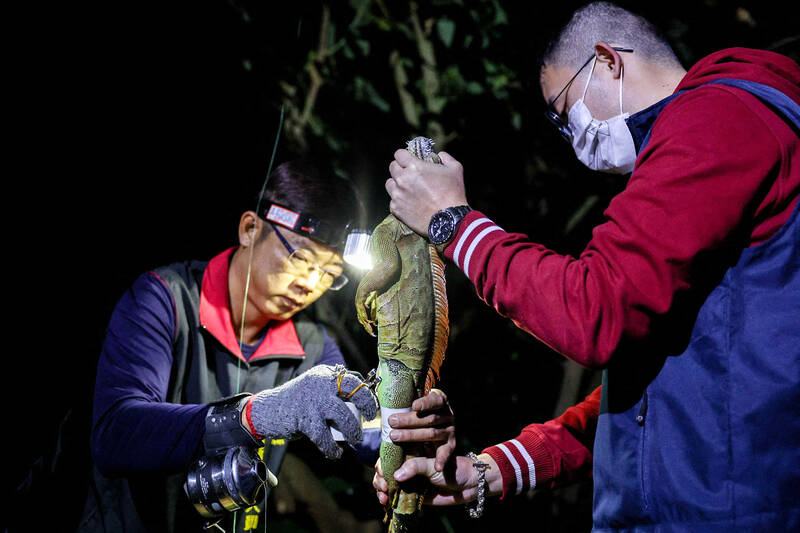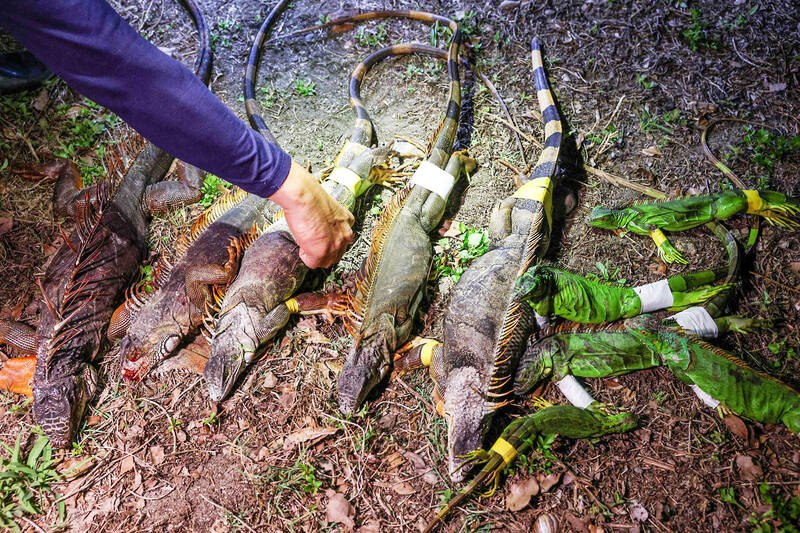Armed with a slingshot, Taiwanese bounty hunter Wu Cheng-hua bends sideways and aims his lethal weapon up at a green iguana, one of tens of thousands in the crosshairs of a government cull.
Taiwan’s iguana population has exploded since the spikey-backed giant lizards were introduced from Central and South America more than 20 years ago as exotic pets. Many escaped, or were dumped, and have bred rapidly in the warm climate of the island’s south, invading neighbourhoods and ravaging farmers’ crops. After Wu finishes his shift at a breakfast eatery, he joins a group of hunters hired by the Pingtung County government, which pays up to NT$500 (US$15) per iguana.
“Sometimes we’ve been lucky and caught 300 iguanas in a day,” said Wu, 25. “Sometimes we were not so lucky and caught two, three or a dozen.”

Photo: AFP
Carrying harpoon slingshots used for spearfishing and wearing rubber boots, the hunters crane their necks as they scan the thick forest for iguanas, which live in the canopy. There are more misses than hits as the men fire their stainless steel darts at the prehistoric-looking creatures high up in the trees and shielded by leaves and branches. One iguana plunges several meters to the ground and runs for its life after being shot. Another is shot multiple times before it is pulled out of the tree still alive. The men bind the legs of the captured iguanas to stop them escaping and leave them on the ground as they carry on hunting.
‘A PERFECT STORM’
Taiwan began culling iguanas nearly 10 years ago and this year’s target has been set at more than 100,000.

Photo: AFP
Experts and government officials say the effort is unlikely to eradicate the reptiles, which have also become pests in other countries, including the US.
Some estimates put Taiwan’s green iguana population at 200,000. A female iguana breeds once a year, laying dozens of eggs at a time.
“Climate anomalies” have fueled iguana numbers in recent years, said Chen Tien-hsi, a wildlife expert at the National Pingtung University of Science and Technology. A lack of seasonal rain and unusually warm winters have increased hatching and survival rates of the young, which Chen said had created “a perfect storm for explosive population growth.”

Photo: AFP
Pingtung County has ramped up its iguana cull from a few hundred a year in the beginning to 48,000 last year, Agriculture Department director-general Cheng Yung-yu said.
But Cheng said more effective “removal strategies” were needed.
“Despite significant manpower and resources being spent on their removal annually, their population continues to grow almost exponentially,” he said.

Photo: AFP
‘THEY MOVE VERY FAST’
Local farmer Cheng Hui-jung has watched iguanas decimate her family’s red bean crop, even after they installed fishing nets to protect their fields from the herbivores.
The iguanas live in the dense bamboo growing between her land and a river, and come down during the day to feast on the red bean shoots. “They move very fast and we couldn’t catch them,” said Cheng, who worries some farmers will resort to cutting down the trees or give up planting crops altogether.
Regular people are being encouraged to get involved in the iguana cull. Hsin Tseng-kuan said she was scared the first time she encountered an iguana on her farm and resolved to learn how to catch them.
“They’re not even afraid of people,” said Hsin, 58, one of more than 80 people taking part in a government training session where they are shown how to use a snare pole to lasso a soft toy iguana.
“When we first saw one, we were the ones who were scared,” Hsin said.
“It really looked like a small dinosaur.”
‘MINIMIZE SUFFERING’
Animal rights group PETA has urged Taiwan to find “non-lethal strategies” for controlling its iguana population or, if culling was deemed necessary, to “minimize suffering” of the creatures.
Several hunters said they would be able to kill more efficiently and humanely if they were allowed to use air guns, the use of which is tightly controlled by the government.
Wu and his colleagues end their hunt in the early evening after catching 14 iguanas in three hours.
The reptiles — some of them alive and bloodied — are laid on the ground before being tossed into a plastic box.
Hunters are required to euthanize the iguanas and keep them in a freezer until they can be incinerated by the government.
While hunting was physically harder than his cooking job, Wu said he liked helping farmers protect their crops.
“Otherwise, everything they grow will be eaten up,” Wu said.
“It is very sad to see them like this.”

Feb. 17 to Feb. 23 “Japanese city is bombed,” screamed the banner in bold capital letters spanning the front page of the US daily New Castle News on Feb. 24, 1938. This was big news across the globe, as Japan had not been bombarded since Western forces attacked Shimonoseki in 1864. “Numerous Japanese citizens were killed and injured today when eight Chinese planes bombed Taihoku, capital of Formosa, and other nearby cities in the first Chinese air raid anywhere in the Japanese empire,” the subhead clarified. The target was the Matsuyama Airfield (today’s Songshan Airport in Taipei), which

For decades, Taiwan Railway trains were built and serviced at the Taipei Railway Workshop, originally built on a flat piece of land far from the city center. As the city grew up around it, however, space became limited, flooding became more commonplace and the noise and air pollution from the workshop started to affect more and more people. Between 2011 and 2013, the workshop was moved to Taoyuan and the Taipei location was retired. Work on preserving this cultural asset began immediately and we now have a unique opportunity to see the birth of a museum. The Preparatory Office of National

China has begun recruiting for a planetary defense force after risk assessments determined that an asteroid could conceivably hit Earth in 2032. Job ads posted online by China’s State Administration of Science, Technology and Industry for National Defence (SASTIND) this week, sought young loyal graduates focused on aerospace engineering, international cooperation and asteroid detection. The recruitment drive comes amid increasing focus on an asteroid with a low — but growing — likelihood of hitting earth in seven years. The 2024 YR4 asteroid is at the top of the European and US space agencies’ risk lists, and last week analysts increased their probability

On Jan. 17, Beijing announced that it would allow residents of Shanghai and Fujian Province to visit Taiwan. The two sides are still working out the details. President William Lai (賴清德) has been promoting cross-strait tourism, perhaps to soften the People’s Republic of China’s (PRC) attitudes, perhaps as a sop to international and local opinion leaders. Likely the latter, since many observers understand that the twin drivers of cross-strait tourism — the belief that Chinese tourists will bring money into Taiwan, and the belief that tourism will create better relations — are both false. CHINESE TOURISM PIPE DREAM Back in July